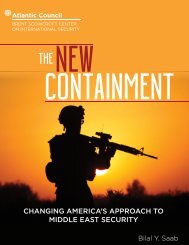POLITICS GOVERNANCE STATE-SOCIETY RELATIONS
Politics_Governance_and_State-Society_Relations_web_1121
Politics_Governance_and_State-Society_Relations_web_1121
Create successful ePaper yourself
Turn your PDF publications into a flip-book with our unique Google optimized e-Paper software.
<strong>POLITICS</strong>, <strong>GOVERNANCE</strong>, AND <strong>STATE</strong>-<strong>SOCIETY</strong> <strong>RELATIONS</strong><br />
Order through Savagery: The Islamic<br />
State<br />
In the midst of the Iraqi and Syrian civil wars, ISIS<br />
emerged from what was previously al-Qaeda in Iraq.<br />
As William McCants of the Brookings Institution<br />
relates at length in his book, The ISIS Apocalypse,<br />
ISIS is not merely a terrorist group, but a movement<br />
that aspires to govern—and its model of governance<br />
must be taken seriously as a challenge to confront. 20<br />
ISIS’s interpretation of religious scripture leads it<br />
to argue that the End Times are fast approaching,<br />
and the new Islamic Caliphate must be established<br />
to aid the Mahdi (messiah) in his final struggle<br />
against evil. Like the Taliban who swept through<br />
Afghanistan in the late 1990s, ISIS takes advantage<br />
of populations brutalized by ongoing war, securing<br />
their acquiescence if not their loyalty by providing<br />
order and swift, clear justice. Rules of behavior are<br />
unambiguous and are immediately and mercilessly<br />
enforced. The brutality of ISIS’s actions—its<br />
murder, rape, and enslavement of non-Sunnis, its<br />
videotaped beheading of hostages, and its harsh<br />
punishments—are not designed to win the hearts<br />
and minds of the masses of Muslims globally.<br />
Whereas al-Qaeda counseled gradual persuasion<br />
and coalition-building before moving toward the<br />
establishment of a caliphate, ISIS does not care<br />
about being popular. Its brutality is designed to<br />
compel swift compliance from local populations,<br />
gain rapid control over territory and resources for<br />
their state, and give the group’s adherents a sense<br />
of divinely aided progress toward their ideological<br />
goal of establishing the caliphate and laying the<br />
groundwork for the apocalypse. 21 ISIS has sought<br />
to provide basic services to those under its yoke:<br />
postal services, banking, health care, and the<br />
harshest sort of justice. ISIS is not a model most<br />
sentient human beings would freely choose to live<br />
under, but it does offer a form of order (predictable<br />
rather than arbitrary coercion) and some degree<br />
of public services (rough justice with hudud<br />
punishments, education, etc.), and it markets itself<br />
aggressively as a successful model of governance,<br />
imposing its vision of God’s order on a region in<br />
chaos.<br />
ISIS is not just an accelerant of chaos, but is also<br />
a symptom of the underlying regional disorder—<br />
not the cause and not the disease. ISIS, like its<br />
20 William McCants, The ISIS Apocalypse: The History, Strategy,<br />
and Doomsday Vision of the Islamic State (New York: St.<br />
Martin’s Press, 2015).<br />
21 William McCants, “How ISIL Out-Terrorized Bin Laden,”<br />
Politico, August 19, 2015, http://www.politico.com/magazine/<br />
story/2015/08/isis-jihad-121525_Page2.html#ixzz3jPEvIZt9.<br />
predecessor al-Qaeda in Iraq, gained strength on<br />
the back of Iraqi Sunnis’ disenchantment with a<br />
Shia-led Iraqi government that seems committed to<br />
the marginalization of its community’s leaders, and<br />
that enabled and even encouraged Shia militias that<br />
committed abuses against Sunnis with impunity.<br />
American officials leading the international coalition<br />
against ISIS have said repeatedly that military force<br />
alone will not defeat ISIS, but that more inclusive and<br />
reliable governance arrangements will be crucial to<br />
sapping the grievances and alienation that give ISIS<br />
local sympathy and room for maneuver. 22<br />
There is no reason to believe this security<br />
imperative for inclusive and impartial governance<br />
in Iraq and Syria is not equally relevant in Libya,<br />
or in other less-than-well-governed countries of<br />
the Middle East. Where leaders have the will and<br />
capacity to rule without violence, where citizens<br />
are active participants in public life, and where<br />
state institutions respond to citizens’ needs and are<br />
accountable to the public, terrorism may still exist—<br />
but it will be a marginalized phenomenon instead<br />
of an existential threat to the social and political<br />
order.<br />
Renewed Authoritarianism: Egypt under<br />
Sisi<br />
Alongside fragile democracy and brutal jihadist<br />
rule, a third model has emerged in the post-2011<br />
Middle East: renewed authoritarianism. Whereas<br />
the pre-2011 Arab states had been corporatist<br />
entities that tried to use co-optation more than<br />
coercion and that (especially in later years)<br />
experimented with democratic forms and limited<br />
political participation, the renewed authoritarian<br />
model seeks to reestablish the preeminence of state<br />
power and to avoid any unpredictability in political<br />
affairs. It rests on the view that opening up politics<br />
is evidently dangerous and that there is no room<br />
for experimentation; attempts at political opening<br />
in the Arab world have empowered Islamist radicals<br />
and produced threats to public security and state<br />
survival. Thus, the priority must be security and<br />
the restoration of a predictable order in which<br />
the state’s authority, even if weakened, still goes<br />
unchallenged.<br />
22 For example, General John Allen said in October 2015 that<br />
“Where there is weak governance, where there is no hope for<br />
large segments of the population, where the prospects for a<br />
future are dim, it is a location on the globe and it is a segment<br />
of the population that is ripe for radicalization.” “Allen: Global<br />
Coalition Making Progress in 5 Lines of Effort Against ISIS,”<br />
by Megan Eckstein, October 14, 2015 https://news.usni.<br />
org/2015/10/14/allen-global-coalition-making-progress-in-5-<br />
lines-of-effort-against-isis.<br />
ATLANTIC COUNCIL<br />
23



